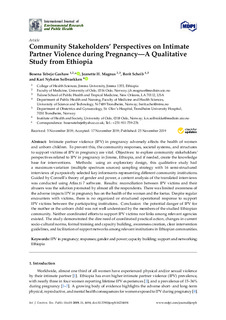| dc.contributor.author | Gashaw, Bosena Tebeje | |
| dc.contributor.author | Magnus, Jeanette H. | |
| dc.contributor.author | Schei, Berit | |
| dc.contributor.author | Solbrække, Kari Nyheim | |
| dc.date.accessioned | 2020-02-20T09:52:11Z | |
| dc.date.available | 2020-02-20T09:52:11Z | |
| dc.date.created | 2019-11-27T14:48:37Z | |
| dc.date.issued | 2019 | |
| dc.identifier.citation | International Journal of Environmental Research and Public Health. 2019, 16 (23), 1-13. | nb_NO |
| dc.identifier.issn | 1660-4601 | |
| dc.identifier.uri | http://hdl.handle.net/11250/2642815 | |
| dc.description.abstract | Abstract:Intimate partner violence (IPV) in pregnancy adversely affects the health of womenand unborn children. To prevent this, the community responses, societal systems, and structuresto support victims of IPV in pregnancy are vital. Objectives: to explore community stakeholders’perspectives related to IPV in pregnancy in Jimma, Ethiopia, and if needed, create the knowledgebase for interventions.Methods: using an exploratory design, this qualitative study hada maximum-variation (multiple spectrum sources) sampling strategy with 16 semi-structuredinterviews of purposively selected key informants representing different community institutions.Guided by Connell’s theory of gender and power, a content analysis of the translated interviewswas conducted using Atlas.ti 7 software. Results: reconciliation between IPV victims and theirabusers was the solution promoted by almost all the respondents. There was limited awareness ofthe adverse impacts IPV in pregnancy has on the health of the woman and the foetus. Despite regularencounters with victims, there is no organized or structured operational response to supportIPV victims between the participating institutions. Conclusion: the potential danger of IPV forthe mother or the unborn child was not well understood by the members of the studied Ethiopiancommunity. Neither coordinated efforts to support IPV victims nor links among relevant agenciesexisted. The study demonstrated the dire need of coordinated practical action, changes in currentsocio-cultural norms, formal training and capacity building, awareness creation, clear interventionguidelines, and facilitation of support networks among relevant institutions in Ethiopian communities | nb_NO |
| dc.language.iso | eng | nb_NO |
| dc.publisher | MDPI | nb_NO |
| dc.rights | Navngivelse 4.0 Internasjonal | * |
| dc.rights.uri | http://creativecommons.org/licenses/by/4.0/deed.no | * |
| dc.title | Community Stakeholders’ Perspectives on Intimate Partner Violence during Pregnancy—A Qualitative Study from Ethiopia | nb_NO |
| dc.type | Journal article | nb_NO |
| dc.type | Peer reviewed | nb_NO |
| dc.description.version | publishedVersion | nb_NO |
| dc.source.pagenumber | 1-13 | nb_NO |
| dc.source.volume | 16 | nb_NO |
| dc.source.journal | International Journal of Environmental Research and Public Health | nb_NO |
| dc.source.issue | 23 | nb_NO |
| dc.identifier.doi | 10.3390/ijerph16234694 | |
| dc.identifier.cristin | 1753168 | |
| dc.description.localcode | © 2019 by the authors. Licensee MDPI, Basel, Switzerland. This article is an open access article distributed under the terms and conditions of the Creative Commons Attribution (CC BY) license (http://creativecommons.org/licenses/by/4.0/). | nb_NO |
| cristin.unitcode | 1920,13,0,0 | |
| cristin.unitcode | 194,65,20,0 | |
| cristin.unitname | Kvinneklinikken | |
| cristin.unitname | Institutt for samfunnsmedisin og sykepleie | |
| cristin.ispublished | true | |
| cristin.fulltext | original | |
| cristin.qualitycode | 1 | |

